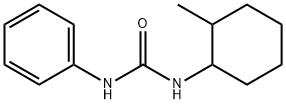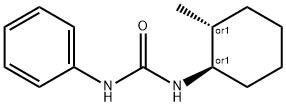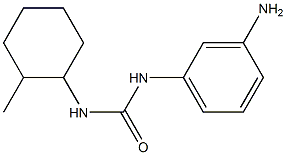SIDURON
Synonym(s):1-(2-Methylcyclohexyl)-3-phenylurea
- CAS NO.:1982-49-6
- Empirical Formula: C14H20N2O
- Molecular Weight: 232.32
- MDL number: MFCD00072453
- EINECS: 217-844-2
- SAFETY DATA SHEET (SDS)
- Update Date: 2024-12-18 13:37:16

What is SIDURON?
Chemical properties
Colorless or white crystalline solid or powder. Odorless. Commercial product is available as an emulsifi- able concentrate.
The Uses of SIDURON
Selective preemergence herbicide used to control annual weed grasses and prevent growth of crabgrass, foxtail and barnyard grass in turf, cereals and other food crops.
Definition
ChEBI: Siduron is a member of ureas.
General Description
Siduron is a pre-emergence and post emergence phenylurea herbicide used for the control of annual grass weeds. Its mode of action involves the inhibition of photosynthesis.
Agricultural Uses
Herbicide: A pre-emergence herbicide used to control annual grasses, e.g., crabgrass, foxtail, and barnyard grass. Used on newly seeded or established turf and lawn grasses and as pre-emergence treatment to bare soil following spring seeding. Not listed for use in EU countries. Registered for use in the U.S.
Trade name
GREENFIELD®; GRO-TONE®[C]; H-1318®; TREY®; TUPERSAN®
Potential Exposure
A phenyl urea preemergence herbicide used to control annual grasses (e. g., crabgrass, foxtail, and barnyard grass) and on newly seeded or established turf and lawn grasses and as bare soil treatment following spring seeding.
Environmental Fate
Soil. A fungus and two Pseudomonas spp. isolated from soil degraded siduron to form
the major metabolites: 1-(4-hydroxy-2-methylcyclohexyl)-3-(p-hydroxyphenyl)urea, 1-(4-
hydroxy-2-methylcyclohexyl)-3-phenylurea and 1-(4-hydroxyphenyl)-3-(2-methycyclohexyl)urea (Belasco and Langsdorf, 1969).
Plant. After 8 days following absorption in barley plants, no metabolites were detected
(Splittstoesser and Hopen, 1968).
Shipping
UN2767 Phenyl urea pesticides, solid, toxic, Hazard Class: 6.1; Labels: 6.1-Poisonous materials. UN3002 Phenyl urea pesticides, liquid, toxic, Hazard Class: 6.1; Labels: 6.1-Poisonous materials.
Waste Disposal
Incinerate in a unit with efflu- ent gas scrubbing. Containers must be disposed of properly by following package label directions or by contacting your local or federal environmental control agency, or by contacting your regional EPA office.
Properties of SIDURON
| Melting point: | 135.5℃ |
| Boiling point: | 374.49°C (rough estimate) |
| Density | 1.0151 (rough estimate) |
| refractive index | 1.5110 (estimate) |
| storage temp. | 0-6°C |
| form | Powder |
| pka | 12.38±0.40(Predicted) |
| color | Light gray |
| Water Solubility | 18mg/L(25 ºC) |
| Merck | 13,8561 |
| BRN | 2725940 |
| CAS DataBase Reference | 1982-49-6 |
| EPA Substance Registry System | Siduron (1982-49-6) |
Safety information for SIDURON
| Signal word | Warning |
| Pictogram(s) |
 Exclamation Mark Irritant GHS07 |
| GHS Hazard Statements |
H315:Skin corrosion/irritation H319:Serious eye damage/eye irritation H335:Specific target organ toxicity, single exposure;Respiratory tract irritation |
| Precautionary Statement Codes |
P261:Avoid breathing dust/fume/gas/mist/vapours/spray. P305+P351+P338:IF IN EYES: Rinse cautiously with water for several minutes. Remove contact lenses, if present and easy to do. Continuerinsing. |
Computed Descriptors for SIDURON
New Products
(S)-3-Aminobutanenitrile hydrochloride 4-Methylphenylacetic acid N-Boc-D-alaninol N-BOC-D/L-ALANINOL Tert-butyl bis(2-chloroethyl)carbamate 3-Morpholino-1-(4-nitrophenyl)-5,6-dihydropyridin- 2(1H)-one Furan-2,5-Dicarboxylic Acid Tropic acid 1-Bromo-3,5-Di-Tert-Butylbenzene S-2-CHLORO PROPIONIC ACID ETHYL ISOCYANOACETATE 2-Bromo-1,3-Bis(Dimethylamino)Trimethinium Hexafluorophosphate 4-IODO BENZOIC ACID 3-NITRO-2-METHYL ANILINE 1-(2,4-DICHLOROPHENYL) ETHANAMINE (2-Hydroxyphenyl)acetonitrile 4-Bromopyrazole 2-(Cyanocyclohexyl)acetic acid 4-methoxy-3,5-dinitropyridine 1-(4-(aminomethyl)benzyl)urea hydrochloride 2-aminopropyl benzoate hydrochloride diethyl 2-(2-((tertbutoxycarbonyl)amino) ethyl)malonate tert-butyl 4- (ureidomethyl)benzylcarbamate Ethyl-2-chloro((4-methoxyphenyl)hydrazono)acetateRelated products of tetrahydrofuran

![(SPIRO[5,5-ADAMANTYL])-2-PHENYL-1,2,4-TRIAZOLAN-3-ONE](https://img.chemicalbook.in/StructureFile/ChemBookStructure2/GIF/CB0333300.gif)


![SPIRO-1-[3-PHENYL-4-OXO-2,3,5-THIAZOLO]-4-[2,3-DIPHENYLHEXAHYDRO]-1,2-BENZISOXAZOLE](https://img.chemicalbook.in/StructureFile/ChemBookStructure3/GIF/CB9161315.gif)



You may like
-
 2033-24-1 98%View Details
2033-24-1 98%View Details
2033-24-1 -
 42831-50-5 5-METHYLISOXAZOLE-4-CARBOXYLIC ACID 98%View Details
42831-50-5 5-METHYLISOXAZOLE-4-CARBOXYLIC ACID 98%View Details
42831-50-5 -
 1975-50-4 98%View Details
1975-50-4 98%View Details
1975-50-4 -
 2-HYDROXY BENZYL ALCOHOL 98%View Details
2-HYDROXY BENZYL ALCOHOL 98%View Details
90-01-7 -
 2-Chloro-1,3-Bis(Dimethylamino)Trimethinium Hexafluorophosphate 221615-75-4 98%View Details
2-Chloro-1,3-Bis(Dimethylamino)Trimethinium Hexafluorophosphate 221615-75-4 98%View Details
221615-75-4 -
 61397-56-6 CIS BROMO BENZOATE 98%View Details
61397-56-6 CIS BROMO BENZOATE 98%View Details
61397-56-6 -
 14714-50-2 (2-Hydroxyphenyl)acetonitrile 98+View Details
14714-50-2 (2-Hydroxyphenyl)acetonitrile 98+View Details
14714-50-2 -
 118753-70-1 98+View Details
118753-70-1 98+View Details
118753-70-1